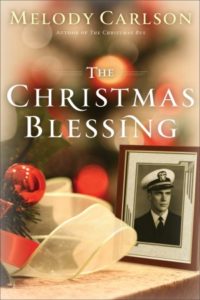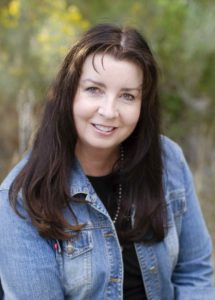Award-winning author Melody Carlson has written more than 200 books for teens, women, and children, some of which have even been optioned for TV and film. Her YA novels appeal to teens around the world, and her annual Christmas novellas grow more popular with each passing year.
This holiday season, Melody delights readers with The Christmas Blessing (Revell), a moving World War II-era story about a young woman who finds herself in trouble after her baby’s father is shot down in the South Pacific. In this interview, Melody shares about The Christmas Blessing, what she enjoys most about Christmas, and what keeps her inspired as a writer…

Would you tell us a little about The Christmas Blessing?
A young woman is caught in a hard place — she has an infant whose father was shot down in the Pacific in WWII. Jobless and without family support, she seeks out her son’s paternal grandparents in Montana, hoping they can help. But they know nothing of her — and her presence isn’t exactly welcomed. She makes some difficult choices — and miracles happen.
What made you decide to do an annual Christmas novella? What year did you begin?
My first Christmas novella, Angels in the Snow, came out in 2002. It was a story about an artist who’d lost her husband and son and was trying to get back to her art — and her life. For some reason, it really seemed to connect with readers. At the time, few publishers were releasing holiday novellas, but because it worked, I’ve done them ever since. I think that makes about 16 books.
Many of your other Christmas novellas are in contemporary settings, but this year’s story is set in the WWII era, like your wonderful Mulligan Sisters series. What has inspired you lately to write stories in this period?
You’re right, most of my other novellas are contemporary — although The Christmas Pony is in the 1930s and An Irish Christmas is set in the 1960s. But because I was having such a great time writing The Mulligan Sisters series, I was probably obsessed with the 1940s — an era I wouldn’t mind living in.
Also, the story I wanted to tell really lent itself to that era. It’s amazing the freedom you can have writing a story that has no cell phones or internet interference. Of course, it requires more historical research, but that’s the fun part.
You have been such a prolific author, writing in different genres and for different age groups. What keeps the ideas coming for you? Where do you find inspiration, and what do you do if you are not feeling inspired?
It takes very little to get a story percolating in me. It can be a scene that makes me wonder, a sentence from the newspaper, a vivid dream, a childhood memory — and so on. I find inspiration all around me and the challenge is to not try to make everything into a book. But sometimes, if I’ve been crunching on a deadline, or life is a challenge, I will take a break and clear my head — usually spending some time in nature — and wait until I feel inspired. Thankfully, it never takes very long.
As a child, did you want to be a writer? What is the first thing you remember writing?
I actually was a “writer” as a child. At least I thought I was — because from the earliest ages, I attempted to write and illustrate stories. The first thing I recall writing– probably because my mom saved it — was a story about a cat named Muzette that loved to play the piano by running up and down the keyboard in the middle of the night. I typed the story on the old Underwood typewriter that sits on my desk now and illustrated it with pencil drawings, then stapled it together with a foil wrapping-paper cover. I was about 7.
What do you enjoy personally about Christmas? Do you have any favorite traditions with your family?
I love the general ambiance of Christmas—decorating, music, food, gatherings–and I used to “do it all.” But as I get older, I feel that the best part is just being with family and friends. I’ve learned to let some traditions and expectations go and try to just go with the flow. Everyone is much happier (and less stressed) that way. And I remind myself that the first Christmas was relatively “simple.”
 Can you give our readers any hints about what you are working on now?
Can you give our readers any hints about what you are working on now?
I just finished the final Mulligan Sisters book (When We Meet Again) and am now starting a new historical and slightly suspenseful series called Legacy of Sunset Cove that’s set in the Prohibition era on the Oregon Coast. I guess I’m still into historical writing.
What are some of your favorite ways to spend time when you are not working?
Besides just kicking back with a good book or enjoying the beautiful outdoors, I love going out in our motor home. Our goal is to travel across the U.S. and meet readers and drop off books in libraries … hopefully in the not-too-distant future.
What are you most looking forward to in 2018?
I really hope that our life can slow down. We recently “downsized” and it feels like it’s taking forever to get settled in, probably because we immediately realized our “downsize” was too extreme and we’ve been adding on to it. Hopefully we’ll get it figured out in the next year. Warning to downsizers: it’s more work than you think.


